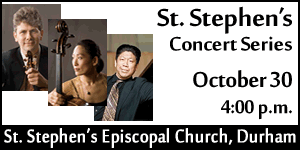 Musicians from the American Dance Festival gave a virtual concert Tuesday night. To say the program was eclectic would be a gross understatement. The musicians recorded their selections from a variety of locales (mostly from their homes, it seemed) and uploaded those recordings to YouTube.* The scant hour performance featured both contemporary instruments as well as traditional ones, including several from Africa.
Musicians from the American Dance Festival gave a virtual concert Tuesday night. To say the program was eclectic would be a gross understatement. The musicians recorded their selections from a variety of locales (mostly from their homes, it seemed) and uploaded those recordings to YouTube.* The scant hour performance featured both contemporary instruments as well as traditional ones, including several from Africa.
A short introduction was provided by executive director Jodee Nimerichter. She explained that this was the first-ever live-streamed ADF concert featuring the musicians who usually accompany the dancers during their classes. Over the course of the evening, the audience grew to more than 100 listeners.
The concert opened with Terrence Karn playing a number of instruments in his piece “While My Bellows Gently Squeeze.” The five-minute work began with Karn playing an accordion and a harmonica simultaneously (Bob Dylan-like) with the occasional striking of a cow bell (with Karn’s right foot). The rustic, folky texture grew more animated as he began using a high-hat cymbal topped with a tambourine with his left foot and djembe with his right hand. The composition ended gently with harmonica and accordion.
“From A to B, Through C, avoiding D wherever possible,” by Adam Crawley, featured DJ Plie playing a variety of instruments. The piece opened with an evocative introduction using three different (conch) shells in succession, accompanied by ambient sounds emanating from his computer. Switching to a Keytar synthesizer over a rhythm track, Plie then led the listener to another change of rhythm and tempo realized with a touch of the computer; he added a wailing harmonica to round out the four-minute work.
Next up was a piano composition by Jefferson Dalby, with the composer at the keyboard. “She Said Darlin You Don’t Know Nothin at All” featured undulating chords in the right hand over a quasi-tango rhythm in the left. The gentle piece softly unfolded.
“Music for the Majestic Kora” was performed by Amadou Kouyate on the 21-stringed instrument (the kora). Indigenous to Mali and other western African kingdoms along the Gambia River, the kora has special significance as the instrument of “jalolu,” or the professional musician caste of the Mande society.
The performance commenced with picking and strumming the strings with several repeated passages. Kouyate began playing a drum with one hand while the other strummed the kora; eventually he gave up the kora altogether to end the piece playing on two drums.
Jumping from an instrument hearkening back to the 13th century (kora) to the 20th century (electric guitar), “If You Were Coming in the Fall” sets a poem of the same name by Emily Dickinson. Written and performed by Andy Hasenpflug, this work featured the composer singing the lyrics over an electronic landscape that provided a backdrop for the sparse, gentle, and free guitar accompaniment.
“Conditions,” composed and performed by Del Ward on acoustic guitar, featured rhythmic finger picking and strumming accompanying the singer, who frequently flipped into falsetto for this heart-felt tough-luck story.
The Rhythm Collective was comprised of Khalid Saleem and Atiba Rorie (djembes), Lamar Lewis (dundun), and Sherone Price (shekere). The music opened with a vocal invocation by Rorie accompanied by the two djembe drums before the entire ensemble jumped in. The dundun are three different-sized drums and the shekere is a gourd rattle. The sounds of these African percussion instruments made up the distinctive texture with its hypnotic polyrhythms in the multi-sectional piece.
“The Most Originally Mine” (for Joy Davis) was composed and performed by Eric Mullis on vibraphone with pre-recorded vibraphone repeated riffs. This minimalist-infused work also incorporated some synthesizer sounds in slowly unfolding layers that exploited different registers of the instrument.
Pianist Darby returned to play his composition “Mammaw’s House.” The waltz-like southern folk song has lilting rhythms with returning verses and choruses which were delightfully embellished each time around. “El Color de la Paz” (The Color of Peace) composed and performed by West Oxking concluded the concert. This piece was played on a Hapi steel tongue drum with small wooden mallets, the result sounding a bit like a steel drum. Haunting “melodies” emerged out of complex polyrhythms in an entrancing fashion.
It was a delight to experience live music again. You are still able to hear this concert. Click on this link for the full experience.
*An update from the ADF: “The concert was all live performances except for one that was recorded the day before. Also, while the number count during the performance seemed to hover around 100, by the time YouTube had looked at the stats (it takes them a little time apparently), it was closer to 300 people who joined us for the live concert that evening.”











